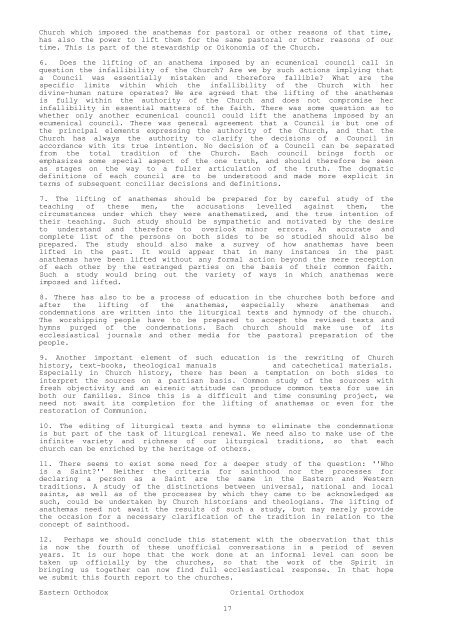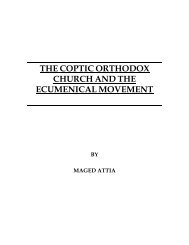Coptic interpretations of the Fourth Ecumenical Council - Saint Mina ...
Coptic interpretations of the Fourth Ecumenical Council - Saint Mina ...
Coptic interpretations of the Fourth Ecumenical Council - Saint Mina ...
Create successful ePaper yourself
Turn your PDF publications into a flip-book with our unique Google optimized e-Paper software.
Church which imposed <strong>the</strong> ana<strong>the</strong>mas for pastoral or o<strong>the</strong>r reasons <strong>of</strong> that time,<br />
has also <strong>the</strong> power to lift <strong>the</strong>m for <strong>the</strong> same pastoral or o<strong>the</strong>r reasons <strong>of</strong> our<br />
time. This is part <strong>of</strong> <strong>the</strong> stewardship or Oikonomia <strong>of</strong> <strong>the</strong> Church.<br />
6. Does <strong>the</strong> lifting <strong>of</strong> an ana<strong>the</strong>ma imposed by an ecumenical council call in<br />
question <strong>the</strong> infallibility <strong>of</strong> <strong>the</strong> Church? Are we by such actions implying that<br />
a <strong>Council</strong> was essentially mistaken and <strong>the</strong>refore fallible? What are <strong>the</strong><br />
specific limits within which <strong>the</strong> infallibility <strong>of</strong> <strong>the</strong> Church with her<br />
divine-human nature operates? We are agreed that <strong>the</strong> lifting <strong>of</strong> <strong>the</strong> ana<strong>the</strong>mas<br />
is fully within <strong>the</strong> authority <strong>of</strong> <strong>the</strong> Church and does not compromise her<br />
infallibility in essential matters <strong>of</strong> <strong>the</strong> faith. There was some question as to<br />
whe<strong>the</strong>r only ano<strong>the</strong>r ecumenical council could lift <strong>the</strong> ana<strong>the</strong>ma imposed by an<br />
ecumenical council. There was general agreement that a <strong>Council</strong> is but one <strong>of</strong><br />
<strong>the</strong> principal elements expressing <strong>the</strong> authority <strong>of</strong> <strong>the</strong> Church, and that <strong>the</strong><br />
Church has always <strong>the</strong> authority to clarify <strong>the</strong> decisions <strong>of</strong> a <strong>Council</strong> in<br />
accordance with its true intention. No decision <strong>of</strong> a <strong>Council</strong> can be separated<br />
from <strong>the</strong> total tradition <strong>of</strong> <strong>the</strong> Church. Each council brings forth or<br />
emphasizes some special aspect <strong>of</strong> <strong>the</strong> one truth, and should <strong>the</strong>refore be seen<br />
as stages on <strong>the</strong> way to a fuller articulation <strong>of</strong> <strong>the</strong> truth. The dogmatic<br />
definitions <strong>of</strong> each council are to be understood and made more explicit in<br />
terms <strong>of</strong> subsequent conciliar decisions and definitions.<br />
7. The lifting <strong>of</strong> ana<strong>the</strong>mas should be prepared for by careful study <strong>of</strong> <strong>the</strong><br />
teaching <strong>of</strong> <strong>the</strong>se men, <strong>the</strong> accusations levelled against <strong>the</strong>m, <strong>the</strong><br />
circumstances under which <strong>the</strong>y were ana<strong>the</strong>matized, and <strong>the</strong> true intention <strong>of</strong><br />
<strong>the</strong>ir teaching. Such study should be sympa<strong>the</strong>tic and motivated by <strong>the</strong> desire<br />
to understand and <strong>the</strong>refore to overlook minor errors. An accurate and<br />
complete list <strong>of</strong> <strong>the</strong> persons on both sides to be so studied should also be<br />
prepared. The study should also make a survey <strong>of</strong> how ana<strong>the</strong>mas have been<br />
lifted in <strong>the</strong> past. It would appear that in many instances in <strong>the</strong> past<br />
ana<strong>the</strong>mas have been lifted without any formal action beyond <strong>the</strong> mere reception<br />
<strong>of</strong> each o<strong>the</strong>r by <strong>the</strong> estranged parties on <strong>the</strong> basis <strong>of</strong> <strong>the</strong>ir common faith.<br />
Such a study would bring out <strong>the</strong> variety <strong>of</strong> ways in which ana<strong>the</strong>mas were<br />
imposed and lifted.<br />
8. There has also to be a process <strong>of</strong> education in <strong>the</strong> churches both before and<br />
after <strong>the</strong> lifting <strong>of</strong> <strong>the</strong> ana<strong>the</strong>mas, especially where ana<strong>the</strong>mas and<br />
condemnations are written into <strong>the</strong> liturgical texts and hymnody <strong>of</strong> <strong>the</strong> church.<br />
The worshipping people have to be prepared to accept <strong>the</strong> revised texts and<br />
hymns purged <strong>of</strong> <strong>the</strong> condemnations. Each church should make use <strong>of</strong> its<br />
ecclesiastical journals and o<strong>the</strong>r media for <strong>the</strong> pastoral preparation <strong>of</strong> <strong>the</strong><br />
people.<br />
9. Ano<strong>the</strong>r important element <strong>of</strong> such education is <strong>the</strong> rewriting <strong>of</strong> Church<br />
history, text-books, <strong>the</strong>ological manuals and catechetical materials.<br />
Especially in Church history, <strong>the</strong>re has been a temptation on both sides to<br />
interpret <strong>the</strong> sources on a partisan basis. Common study <strong>of</strong> <strong>the</strong> sources with<br />
fresh objectivity and an eirenic attitude can produce common texts for use in<br />
both our families. Since this is a difficult and time consuming project, we<br />
need not await its completion for <strong>the</strong> lifting <strong>of</strong> ana<strong>the</strong>mas or even for <strong>the</strong><br />
restoration <strong>of</strong> Communion.<br />
10. The editing <strong>of</strong> liturgical texts and hymns to eliminate <strong>the</strong> condemnations<br />
is but part <strong>of</strong> <strong>the</strong> task <strong>of</strong> liturgical renewal. We need also to make use <strong>of</strong> <strong>the</strong><br />
infinite variety and richness <strong>of</strong> our liturgical traditions, so that each<br />
church can be enriched by <strong>the</strong> heritage <strong>of</strong> o<strong>the</strong>rs.<br />
11. There seems to exist some need for a deeper study <strong>of</strong> <strong>the</strong> question: ''Who<br />
is a <strong>Saint</strong>?'' Nei<strong>the</strong>r <strong>the</strong> criteria for sainthood nor <strong>the</strong> processes for<br />
declaring a person as a <strong>Saint</strong> are <strong>the</strong> same in <strong>the</strong> Eastern and Western<br />
traditions. A study <strong>of</strong> <strong>the</strong> distinctions between universal, national and local<br />
saints, as well as <strong>of</strong> <strong>the</strong> processes by which <strong>the</strong>y came to be acknowledged as<br />
such, could be undertaken by Church historians and <strong>the</strong>ologians. The lifting <strong>of</strong><br />
ana<strong>the</strong>mas need not await <strong>the</strong> results <strong>of</strong> such a study, but may merely provide<br />
<strong>the</strong> occasion for a necessary clarification <strong>of</strong> <strong>the</strong> tradition in relation to <strong>the</strong><br />
concept <strong>of</strong> sainthood.<br />
12. Perhaps we should conclude this statement with <strong>the</strong> observation that this<br />
is now <strong>the</strong> fourth <strong>of</strong> <strong>the</strong>se un<strong>of</strong>ficial conversations in a period <strong>of</strong> seven<br />
years. It is our hope that <strong>the</strong> work done at an informal level can soon be<br />
taken up <strong>of</strong>ficially by <strong>the</strong> churches, so that <strong>the</strong> work <strong>of</strong> <strong>the</strong> Spirit in<br />
bringing us toge<strong>the</strong>r can now find full ecclesiastical response. In that hope<br />
we submit this fourth report to <strong>the</strong> churches.<br />
Eastern Orthodox Oriental Orthodox<br />
17








